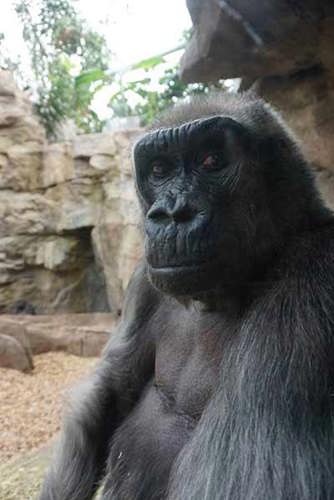Franklin Park Zoo mourns the loss of Gigi the gorilla
Saturday November 30, 2019
 The staff at Franklin Park Zoo is saddened to share that Gigi, a western lowland gorilla, has passed away. The 47-year-old gorilla was being closely monitored for a number of health issues, and over the past few days her condition worsened. She was lethargic, had a decreased appetite and decreased mobility. Due to these concerning changes, she underwent an exam this morning. After assessing her, the decision was made to humanely euthanize her due to her poor prognosis and quality of life concerns.
The staff at Franklin Park Zoo is saddened to share that Gigi, a western lowland gorilla, has passed away. The 47-year-old gorilla was being closely monitored for a number of health issues, and over the past few days her condition worsened. She was lethargic, had a decreased appetite and decreased mobility. Due to these concerning changes, she underwent an exam this morning. After assessing her, the decision was made to humanely euthanize her due to her poor prognosis and quality of life concerns.
“The animal care and veterinary teams take extraordinary care of our geriatric animals to ensure that they enjoy a healthy and comfortable life as they age. We are deeply saddened to share the news of Gigi’s passing. She was part of the zoo family for nearly 40 years, and will be incredibly missed by the staff who has cared for her for so many years. Throughout Gigi’s illness, we have received a tremendous outpouring of support and well wishes from the public, which has meant so much to us,” said John Linehan, Zoo New England President and CEO. “We hope that people will keep Gigi’s care team in their thoughts during this sad time. The staff is incredibly dedicated and attentive, and they doted on Gigi.”
In May, Gigi underwent a comprehensive exam including a CT scan, liver biopsy, and ultrasound in the hopes of determining the cause of ongoing health issues. The CT scan revealed that she had renal disease and liver and uterine tumors. Both of her kidneys showed irreversible chronic degenerative change. Following the CT scan, she underwent a successful ureteral stent procedure to relieve what appeared to be a partial obstruction of urine flow. Gigi responded extremely well to the stent procedure, which greatly improved her quality of life over the past six months.
In recent months, Gigi enjoyed the opportunity to go on exhibit where she could often be seen in her favorite spots holding her favorite stuffed toy – a purple monkey with bananas printed on it. Throughout her illness she spent a lot of time behind the scenes where her care staff worked tirelessly as they closely monitored her behavior, administered medications and worked to improve her food consumption, while doting on her constantly with some of her favorite enrichment. Gigi’s favorite enrichment items included blankets, which she was often spotted carrying and making “nests” with and stuffed toys, which she would cradle and carry wherever she went. She also loved food treats including banana peels, grapes, celery, oatmeal, escarole and yogurt.
Gigi was the oldest member of the gorilla troop at Franklin Park Zoo and among the oldest gorillas living within the North American population managed by the Association of Zoos and Aquariums. She was born at the Cincinnati Zoo on July 13, 1972, and moved to Stone Zoo on March 10, 1980. In the first few years after moving to Stone Zoo, Gigi gave birth to two male offspring. She moved to Franklin Park Zoo in 1989 when the Tropical Forest Pavilion opened.
As Gigi became older, her role within the gorilla troop at Franklin Park Zoo grew into a grandmotherly role. While she showed little interest in Kiki’s newborns, she loved to interact with the younger gorillas once they were comfortable leaving their mom and approaching Gigi for attention. She even let youngsters Kambiri and Aziza ride on her back.
“I loved walking through the Tropical Forest seeing Gigi on exhibit and watching the movement in her face and chest signifying that she grumbled at my presence and was happy to see me. If Gigi really liked you, she would turn her back and sit next to you at the exhibit glass – checking every so often to make sure you were still there,” said Erica Farrell, Assistant Curator of the Tropical Forest at Franklin Park Zoo. “She played an integral role in our gorilla troop and has a special place in all of her caretaker’s hearts. We are all going to miss her.”
Zoo New England is a longtime supporter of field conservation work on behalf of gorillas, including the Ape TAG Conservation Initiative, a collective effort by zoos to help conserve wild populations of endangered apes in their natural habitats. Habitat loss is among the major threats faced by gorillas. Recycling cell phones and other electronics reduces the need for additional coltan, a component of cell phones that is mined in central African forests right in the gorillas’ habitat. This, in turn, reduces the destruction of gorillas’ homes and reduces hunting pressures. Guests to Franklin Park Zoo can drop off their old cell phones, which are recycled through the Eco-Cell program.

